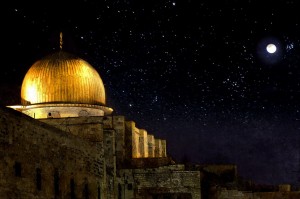Originally posted 2020-03-21 00:04:26.
By Dr. `Ali Al-Salabi
Part ONE
We are going to complete the discussion about the lessons to be learned from the story of Al-Israa’ and Al-Mi`raj that happened to the Prophet Muhammad (peace be upon him) in a serious stage of His preaching mission.
7) The very special night of Al-Isra’ and Mi`raj was chosen as the night during which the five daily prayers were made obligatory; this, as Ibn Kathir mentioned, “points to the care that was taken to show the honor and greatness of prayer.”[1] When we contemplate the importance of prayer, we should remember, among other things, that it was legislated on the blessed night of Al-Israa’ and Al-Mdi`raj, and that, before the Prophet died, it was one of the last things that he advised us about.
8- When the Messenger of Allah was asked about whether he saw his Lord during Al-Mi`raj, he said, ” Light, so how could I see Him (i.e., His veil is light, so how could I see Him?)?” (Muslim)
9- During Al-Israa’ and Al-Mi`raj, the Messenger of Allah saw a great deal of the unseen world – such as matters concerning the past, angels, the heavens, and even the future. The Prophet saw, among other things, the evil consequences of many societal ills. Some societal ills and their consequences which he witnessed that night are as follows:
- The Prophet saw punishment being meted out to When, during that night, the Messenger of Allah saw people eating corpses, Jibril informed him about them, saying, “These are the ones that eat the flesh of people (i.e., backbiters). (Ibn Hajar , Fath Al-Bari)
- He witnessed people being punished for wrongly eating the wealth of orphans. The Messenger of Allah saw men with lips that were big like the lips of camels; in their hands were pieces of fire that were like stones. They would cast them into their mouths, and the pieces would then come out of their buttocks. Jibril informed the Prophet about them, saying, “These are the ones who wrongfully eat the wealth of orphans.” (Seerah by Ibn Hisham)
- Regarding the punishment for those who eat from the proceeds of usury, the Prophet passed by, during his night journey, a group of people whose stomachs were like houses, and inside of them were snakes. From the outside, their insides could be seen. Jibril said to the Prophet, “These are the eaters of usury .” (Ibn Kathir)
- Other narrations mention the punishment of fornicators, of people who refuse to pay Zakat, of speakers who cause Fitnah, and of people who are negligent and carefree when it comes to being trustworthy.
- The Prophet also saw people being rewarded for good deeds. For example, during Al-Mi`raj, he passed by a group of people who planted on the same day as they harvested; and as soon as they finished harvesting, things returned to being as they previously were. Jibril said, ‘These are Al-Mujahidin (those who fight and struggle) in the way of Allah. Their good deeds are multiplied 700 times. And whatever they spend (for the cause of Allah) is replaced (for them).” (Ibn Kathir)
- The Companions understood the importance of Al-Masjid Al-Aqsa and their duties towards it. For a while, it was in the control of the Romans; then the Muslims conquered it during the caliphate of `Umar ibn Al-Khattab. Jerusalem then remained a place of peace and safety until five centuries later when the crusaders conquered it and wreaked havoc on it and its inhabitants. They continued to do so until about a century later, when the Muslims freed it under the military leadership of Salah Ad-Deen Al-Ayyubi (may Allah have mercy on him). Now again, Jerusalem has been violently and brutally taken away from Muslims; who now will free it? Indeed, we belong to Allah, and to Him is our return.
_____________________________
Source: Taken with modifications from the author’s The Noble Life of the Prophet Muhammad.
[1] Tafseer Ibn Kathir (3/23)


